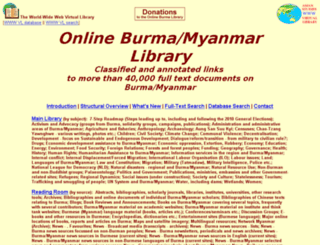Focal point
Location
The Online Burma/Myanmar Library (OBL) is a non-profit online research library mainly in English and Burmese serving academics, activists, diplomats, NGOs, CSOs, CBOs and other Burmese and international actors. It is also, of course, open to the general public. Though we provide lists of Burma/Myanmar news sources, the Library’s main content is not news but in-depth articles, reports, laws, videos and links to other websites, We provide a search engine (database and full text) and an alphabetical list of categories and sub-categories, but the Library is best accessed through browsing the 100 or so categories which lead to sub- and sub-sub categories. These tools should be used in combination.
Members:
Resources
Displaying 756 - 760 of 1151In the Name of Mandalay
Preserving Burmese traditions in Thailand...
"In 1886 the British finally conquered Mandalay, the historic capital of the last independent Burmese kingdom. San Toe, a servant of the beleaguered King Thibaw and a devout Buddhist, fled the newly colonized city, bringing with him an image of the Buddha crafted by Mandalay artisans. He worked in the logging business as an employee of the Bombay Burma Trading Corporation before settling in the town of Mae Sariang in northern Thailand. There he built a Burmese monastery in 1909 to house his cherished Buddha image.
THE IMPACT OF CHINA ON SOUTHEAST ASIAN FORESTS
ABSTRACT:
Some countries have gained control of their forest-exploiting industries through
advanced regulatory regimes. But stricter regulation usually displaces forestexploitation
into countries with weaker regulatory regimes. The most important
current example is the shift of forest-exploitation for the Chinese market from
China into Southeast Asia following the logging ban in China in 1998. In this
paper we describe and document the impact of the logging ban after the 1998
Nyaunglebin District: Food supplies destroyed, villagers forcibly displaced, and region-wide forced labour as SPDC forces seek control over civilians
Between October 2004 and January 2005 SPDC troops launched forays into the hills of Nyaunglebin District in an attempt to flush villagers down into the plains and a life under SPDC control. Viciously timed to coincide with the rice harvest, the campaign focused on burning crops and landmining the fields to starve out the villagers. Most people fled into the forest, where they now face food shortages and uncertainty about this year's planting and the security of their villages.
"Best Practice" Options for the Legal Recognition of Customary Tenure
ABSTRACT:
"Is there a ‘best practice’ model for the legal recognition of customary tenure?
If not, is it possible to identify the circumstances in which a particular model
would be most appropriate? This article considers these questions in the light
of economic theories of property rights, particularly as illustrated by the
World Bank’s 2003 land policy report. While these theories have their flaws,
the underlying concept of tenure security allows a typological framework for
Unter Zwang
Mit Zwangsarbeit, ethnischen Umsiedlungen und ausländischen Investitions-Dollars sichert die Militärjunta ihre Machtstrukturen in Myanmar. Forced labour, internal displacement, foreign investments, power structures.


